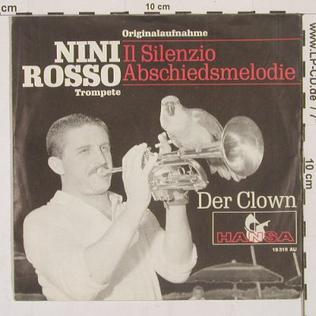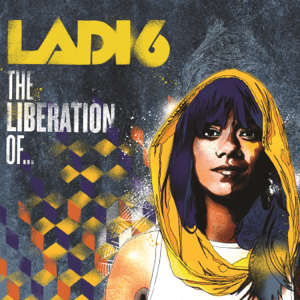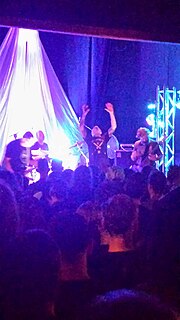"Now Is the Hour" is a popular song from the early 20th century. Often erroneously described as a traditional Māori song, its creation is usually credited to several people, including Clement Scott (music), and Maewa Kaihau and Dorothy Stewart.
The Yandall Sisters were a popular New Zealand-born Samoan all-female singing group of the 1970s, who made a major contribution to music in New Zealand. The members of the group were Caroline, Mary and Adele Yandall, and later younger sister Pauline Yandall.

Rhyme Book is the second studio album by New Zealand rapper Scribe. It follows on from his 2003 award-winning album, The Crusader. It was released on 29 September 2007.

"Il Silenzio" is an instrumental piece, with a small spoken Italian lyric, notable for its trumpet theme. It was written in 1965 by trumpet player Nini Rosso, its thematic melody being an extension of the same Italian Cavalry bugle call used by Russian composer Tchaikovsky to open his Capriccio Italien. It has become a worldwide instrumental standard that has sold around 10 million copies. It was a number-one hit in Italy, Germany, Austria, and Switzerland, and sold over five million copies by the end of 1967. Rosso was awarded a gold disc. On 9 January 1965, it reached the number-two position in Australia and stayed in the charts for 19 weeks, and in the United Kingdom it peaked at number eight on the Record Retailer singles chart. In the United States, it reached number 32 in the Billboard Easy Listening charts. In Canada, the song reached number 24 in the RPM Adult Contemporary charts.
David Keith Dallas is a hip hop artist from New Zealand of Samoan and European descent.

Passive Me, Aggressive You is the debut studio album by New Zealand indie electronic band The Naked and Famous. It was released on 6 September 2010 by Somewhat Damaged. The album debuted at number one on the New Zealand Albums Chart. The album spawned four singles: "All of This", "Young Blood", "Punching in a Dream" and "Girls Like You"; with "Young Blood" peaking at number one on the New Zealand Singles Chart.

The Liberation Of... is the second album by Christchurch-born singer-songwriter/rapper Ladi6, released in November 2010. It was nominated for Album of the Year and won Best Urban/Hip Hop Album at the 2011 New Zealand Music Awards. It also won the 2011 Taite Music Prize and Best Urban Album at the 2011 Pacific Music Awards.

Beastwars is a sludge metal band from New Zealand.

Beastwars is the eponymous debut studio album of the New Zealand-based heavy metal band Beastwars. The album was released on 9 May 2011 through New Zealand independent label Destroy Records, and was distributed by Universal Music. Beastwars received general critical acclaim from New Zealand publications, and reached an RIANZ album chart placing of #15. The album enjoyed further success at the 2011 New Zealand Music Awards, receiving a nomination for best New Zealand rock album and winning the award for best album artwork or packaging. It was also shortlisted for the 2012 Taite Music Prize.
Deane Waretini is a musician from New Zealand. He had a #1 chart hit in 1981 with the song "The Bridge", a Māori language song set to Nini Rosso's tune "Il Silenzio". He is also the son of a historically significant Maori baritone singer and recording artist. In later years, Waretini was featured in a New Zealand television production that was built around him.

The Taite Music Prize is an annual New Zealand music award event. It features the same-named prize awarded for the best album from New Zealand.
Massad Barakat-Devine, known mononymously as Massad, is a New Zealand pop musician. He co-hosted the TV2 show The 4.30 Show, along with Eve Palmer and ex-The Erin Simpson Show presenter Michael Lee.
"The Bridge" was a #1 chart hit in 1981 for New Zealand singer Deane Waretini, and his backing group The Rising Stars. This also marked a first. It was the first Maori language record to hit the no 1 spot in New Zealand. "The Bridge" is an example of an artist in the 1980s contributing to the success of a record. This was done by kick starting the process in the beginning by self-financing the record, having a hand in its own promotion by employing various tactics to get the record heard by the public.
Deane Waretini Snr was a famous Maori baritone singer from Rotorua. He was possibly the first Maori singer to be commercially recorded, together with his cousin Ana Hato. His son Deane Waretini would also be a first with his no 1 hit The Bridge, which became the first Maori language song to be no 1 in the New Zealand music charts.
Now is the Hour is a mockumentary television series starring New Zealand singer Deane Waretini who had a #1 hit with The Bridge in 1981.

Waretini is an album by Deane Waretini which features his hit single "The Bridge".
The Mauri Hikitia is a various artists album released in 1981. It reached no 4 on the New Zealand charts. It features Rhonda, Ken Kincaid, Deane Waretini, and the Lightwood family.
Ode Records is a New Zealand record label. Artists recordings released through the label include Herb McQuay, Deane Waretini. The first release on the label was a single in 1968, "Sally I Do" by Abdullahs' Regime. The label also became an important outlet for ethnic and world music, especially music from Melanesian and Polynesian sources.
The Radars were a New Zealand group that was made up of mainly visually impaired musicians. They backed Deane Waretini on his no 1 hit "The Bridge" in 1981, and they won the Best Polynesian Album award at the 1983 New Zealand Music Awards. They played mainly around Auckland.

20 Studio One Hits was a compilation album of New Zealand and New Zealand based artists culled from the Studio One television series on the N.Z.B.C. It was released in 1972. It was followed up by 20 Studio One Hits Volume 2 the following year. The albums are representative of the televised Studio One talent quests. Some of the songs that appeared on the album went on to become hits in Australasia. The records which were released on the Music for Leisure label are a historical account of the Studio One talent quests.









